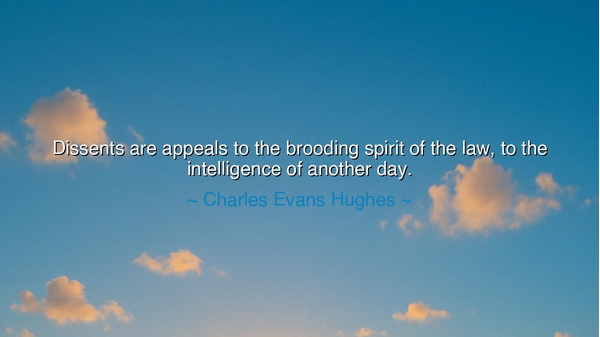
Dissents are appeals to the brooding spirit of the law, to the
Dissents are appeals to the brooding spirit of the law, to the intelligence of another day.






In the solemn and enduring words of Charles Evans Hughes, Chief Justice of the United States and guardian of constitutional thought, we find a truth that resonates far beyond the courtroom: “Dissents are appeals to the brooding spirit of the law, to the intelligence of another day.” These words, rich with moral and philosophical gravity, remind us that truth and justice do not always triumph in the moment, but they endure, waiting for the dawn of understanding in generations yet to come. They speak not only to lawyers and judges, but to all who stand against the tide of their times — those who believe that conscience must sometimes stand alone until the world is ready to listen.
The origin of this quote lies in Hughes’s reflections on the purpose of dissenting opinions within the highest courts of justice. In a system built on law and precedent, the majority’s decision becomes the law of the land — yet the dissent, though powerless in its moment, carries a prophetic force. It is a seed sown into the soil of history. The “brooding spirit of the law” is the living conscience of justice itself — not confined to parchment or verdicts, but a moral energy that evolves with humanity. A dissent, then, is not rebellion; it is faith — faith that truth, though ignored today, will find its voice tomorrow.
To dissent is to refuse to bow before error simply because it wears the robe of authority. It is an act of moral courage, a torch lit in the darkness of consensus. Hughes’s words evoke not defiance for its own sake, but a sacred duty to truth — a reminder that the law, like the human spirit, must grow, must question, must renew itself. For justice is not static; it breathes. And every great advancement in law, as in life, has begun with someone who dared to say, “This is wrong.” The dissenting voice, though isolated in its hour, becomes the conscience of the ages.
Consider the story of Justice John Marshall Harlan, who in 1896 stood alone in dissent against the Supreme Court’s decision in Plessy v. Ferguson. The Court’s majority upheld racial segregation under the doctrine of “separate but equal,” a betrayal of the Constitution’s promise of liberty. Yet Harlan wrote, “Our Constitution is color-blind, and neither knows nor tolerates classes among citizens.” His words were ignored in his lifetime, but they lived on. Decades later, in Brown v. Board of Education (1954), that same spirit — the “brooding spirit of the law” — awoke. Harlan’s lonely dissent became the foundation of justice reborn. His voice, once a whisper, became a trumpet of freedom.
Hughes understood that such dissents are more than legal arguments — they are moral testaments. They speak across time to the “intelligence of another day,” to those yet uncorrupted by prejudice or fear. They are letters written to the future, entrusted to the better angels of human nature. In every age, the dissenter bears the burden of being misunderstood, ridiculed, even condemned. But history, like a wise judge, has a long memory. The courage to dissent is the courage to believe that truth has patience, and that justice, though delayed, is never dead.
The power of this idea reaches far beyond the realm of law. Every reformer, prophet, and visionary has been, in their own way, a dissenter. Galileo, who dared to defy the Church’s doctrine and declare that the Earth moved around the Sun; Martin Luther King Jr., who stood against both legal injustice and moral indifference; Rosa Parks, whose quiet refusal to surrender her seat became an act of revolution — each of them appealed to the “intelligence of another day.” Their voices, like Hughes’s dissents, were seeds waiting for their season of truth.
Thus, this quote is both a reflection and a challenge. It reminds us that to dissent honorably is not to destroy, but to preserve the integrity of truth. When the world seems deaf to reason, we must still speak. When injustice is enshrined in custom, we must still protest. For the progress of civilization depends upon those who are willing to be outnumbered today so that justice may prevail tomorrow. The dissenter does not serve the present — they serve the eternal.
And so, O student of conscience, take this teaching into your life: do not be silent in the face of wrong, even when your voice trembles and stands alone. Speak with the understanding that every honest word, every act of moral clarity, becomes part of the great “brooding spirit” that guides humanity forward. The truth may sleep for a time, but it does not die. To dissent is to keep the flame alive — to trust that another day will come, and with it, the intelligence, compassion, and courage to see what you saw, and to honor the truth you kept alive when others could not.






AAdministratorAdministrator
Welcome, honored guests. Please leave a comment, we will respond soon